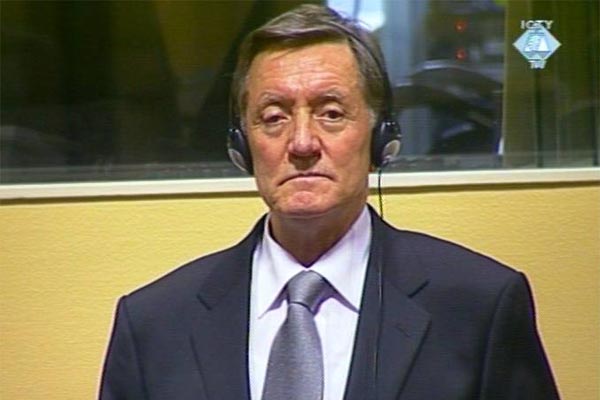Home
SECOND TRIAL FOR TERROR CAMPAIGN AGAINST SARAJEVO BEGINS
As the prosecution notes in its opening statement, General Dragomir Milosevic “inherited” the campaign of terror against Sarajevo and Sarajevans waged by General Stanislav Galic. Milosevic then went on to “elaborate” and “enhance” the campaign by introducing modified bombs, known for their imprecision and destructive power
 Dragomir Milosevic in the courtroom
Dragomir Milosevic in the courtroom When General Dragomir Milosevic took over the command of the VRS Sarajevo-Romanija Corps from his predecessor General Stanislav Galic, he “inherited” the campaign of terror against Sarajevo and Sarajevans, prosecutor Alex Whiting and Stephen Waespi stressed today, as Milosevic’s trial began. According to them, Milosevic "could be in no delusion as to the kind of character of the campaign he was about to inherit”, since he had been in the Sarajevo theatre since the beginning of the war in BH, first as the commander of a brigade in the Sarajevo-Romanija Corps and then as the Corps chief of staff and General Galic’s right hand man. He was appointed the chief of staff in July 1993.
As a trained, professional JNA officer, General Milosevic knew very well that opening “direct, indiscriminate and disproportionate fire” on the town and civilian inhabitants was a violation of “a key principle of international humanitarian law: the principle of distinguishing between military targets and civilians, who must under no circumstances be targets of military attacks”, the prosecutors stated in their opening statement. Even if it forgot the principle, he was reminded of it in 1994 and 1995 by UNPROFOR representatives in frequent protests against artillery and sniper attacks against civilians and civilian facilities carried out by the Sarajevo-Romanija Corps.
To illustrate the point, the prosecutor quoted a letter sent by Colonel Robert May, UNPROFOR commander in Sarajevo, on 6 June 1995 after a series of artillery attacks on civilian facilities and the UN headquarters in Sarajevo. Reminding him of “moral and legal obligations under the Geneva Conventions and guarantees given to the UN”, the British colonel warned General Milosevic that those attacks were “a serious violation of the conventions” and that he could “face trial before the International Tribunal”.
General Milosevic “elaborated” and “enhanced” the campaign he inherited, the prosecution stressed, by introducing modified bombs. From April 1995 on, their destructive power ratcheted up the terror against Sarajevo and Sarajevans. To illustrate the kind of evidence the prosecution intends to lead in the weeks and months ahead, the prosecutor showed orders signed by General Milosevic ordering units under hi command to deploy bomb launchers and select “the most profitable targets”, in other words, targets where “greatest human casualties and physical damage” could be inflicted. Modified bombs are extremely inaccurate and it is impossible to guide them to hit military targets, even if it had been the intention of those who launched them.
In order to shorten its case, at the behest of the Trial Chamber, the prosecution reduced by third the number of “illustrative examples” of the shelling and sniper attacks it intends to call evidence on. In the nine weeks – the time allotted for the prosecution case the court will hear about 15 shelling incidents (including the second attack on the Markale market on 28 August 1995) and 12 sniping incidents. The survivors and eyewitnesses of the attacks will be giving evidence, as will insiders from the Sarajevo-Romanija Corps who were close associates of the accused, former UNPROFOR members and other witnesses. The prosecution will call its first witness on Monday, 15 January.
